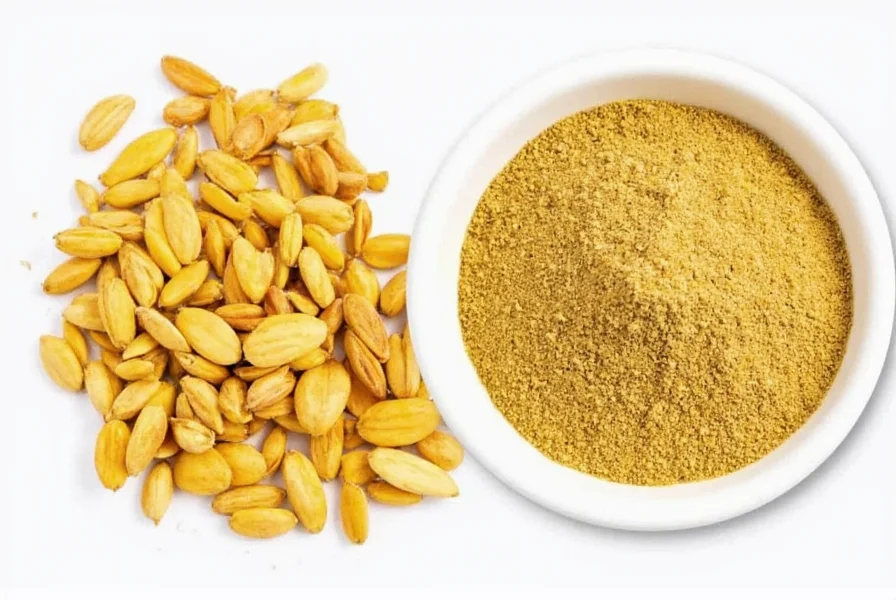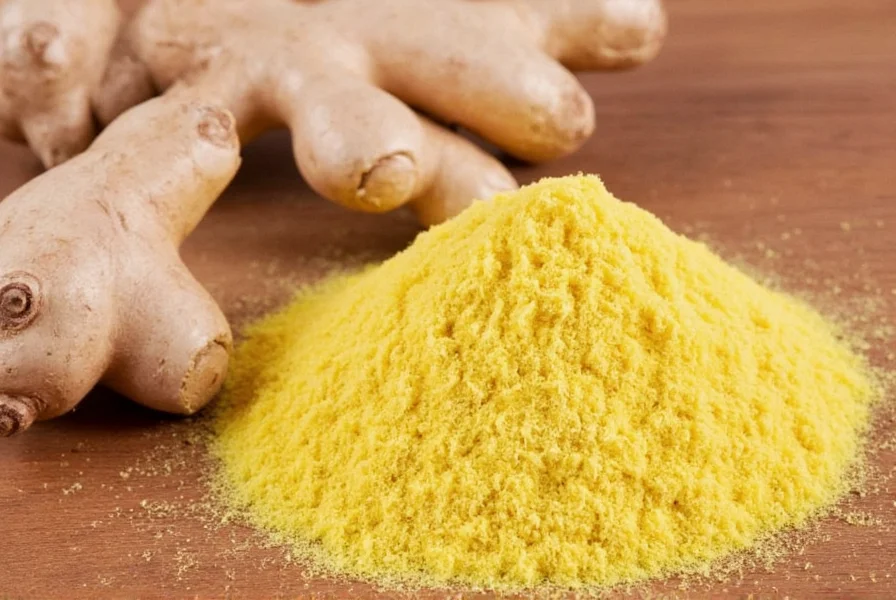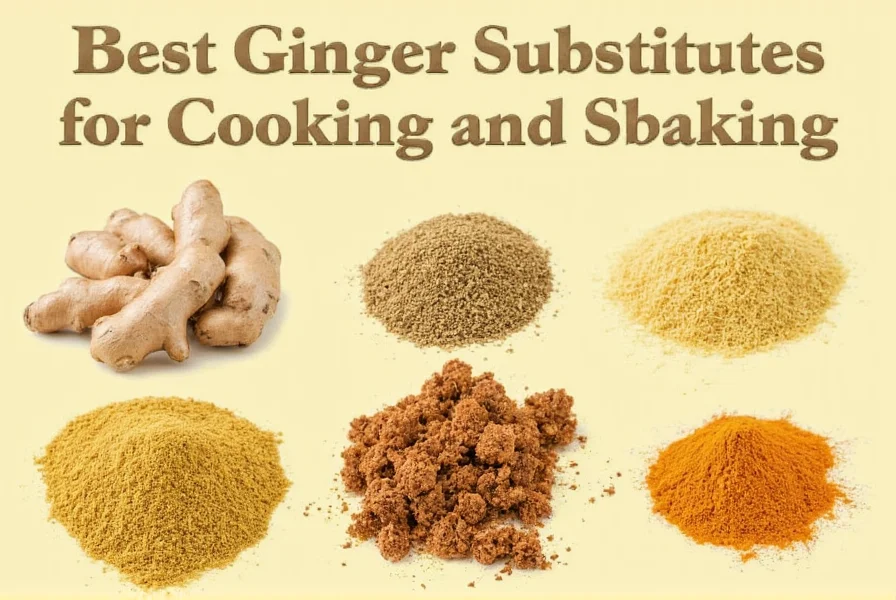The best ginger substitutes depend on your recipe: use 1/4 teaspoon ground ginger for every tablespoon of fresh ginger, galangal for Thai dishes (use 1:1 ratio), allspice for baking (1/2 teaspoon per tablespoon ginger), or a mix of cinnamon and cardamom for sweet recipes. For ginger tea, try turmeric with lemon. Always adjust to taste as substitutes vary in potency.
Running out of ginger mid-recipe is frustrating, but you likely have suitable alternatives in your pantry. Whether you're making stir-fry, baking cookies, or brewing tea, understanding ginger substitutes ensures your dish still delivers that distinctive warm, spicy flavor profile. This guide covers the most effective alternatives based on culinary science and professional chef recommendations.
Why Ginger Substitutes Matter
Ginger's unique flavor comes from gingerol, a compound that provides both heat and citrusy notes. When substituting, consider whether you need the pungency, warmth, or subtle sweetness that ginger contributes to your specific dish. The right substitute maintains your recipe's intended balance without overpowering other ingredients.
Top Ginger Substitutes Ranked by Effectiveness
| Substitute | Ratio (vs Fresh Ginger) | Best For | Flavor Notes |
|---|---|---|---|
| Ground Ginger | 1/4 tsp = 1 tbsp fresh | Baking, spice blends | Less citrusy, more earthy |
| Galangal | 1:1 fresh substitution | Thai & Indonesian dishes | Sharper, pine-like notes |
| Allspice | 1/2 tsp = 1 tbsp ginger | Pumpkin bread, spice cakes | Cloves + cinnamon profile |
| Mace | 1/4 tsp = 1 tbsp ginger | Custards, light sauces | Milder, floral alternative |
| Cinnamon + Cardamom | 1/4 tsp each = 1 tbsp ginger | Oatmeal cookies, chai | Warms without sharpness |
Detailed Substitute Guide
Ground Ginger for Baking
When searching for the best ginger substitute for baking, ground ginger works well in spice cakes and gingerbread. Use 1/4 teaspoon of ground ginger for every tablespoon of fresh ginger called for. Remember that ground ginger lacks the bright citrus notes of fresh ginger, so add 1/8 teaspoon lemon zest per teaspoon of ground ginger to compensate. This adjustment makes ground ginger instead of fresh ginger nearly indistinguishable in most baked goods.

Galangal for Asian Cuisine
For Thai curries or Indonesian dishes needing a fresh ginger substitute in stir fry, galangal provides the closest flavor match. Use equal amounts of fresh galangal to ginger, but note it has a sharper, more peppery taste with subtle pine notes. Peel thoroughly before use, as galangal's skin is tougher than ginger's. Avoid using dried galangal powder as a 1:1 substitute—it requires rehydration and has different potency.
Allspice for Sweet Recipes
Allspice works surprisingly well as a ginger alternative for recipes with warm spices. Use half the amount of allspice compared to ginger (1/2 teaspoon allspice per tablespoon ginger). This works particularly well in pumpkin pie, apple crisp, and spice cookies where the clove-cinnamon-nutmeg blend complements other ingredients. Professional bakers often combine allspice with a pinch of black pepper to mimic ginger's heat.
Specialized Substitutes
For ginger tea: Turmeric root (1:1 ratio) with lemon and black pepper creates similar warmth with added health benefits. The earthy flavor differs slightly but provides comparable soothing properties.
For sushi ginger: No true substitute exists, but thinly sliced young ginger soaked in vinegar with a touch of sugar creates acceptable pickled ginger.
For marinades: A blend of 1/2 teaspoon mustard powder, 1/4 teaspoon white pepper, and 1/8 teaspoon coriander mimics ginger's pungency in meat rubs.
What NOT to Use as Ginger Substitutes
Avoid these common but ineffective substitutions:
- Horseradish (too sharp, different flavor profile)
- Fresh turmeric alone (lacks ginger's citrus notes)
- Cayenne pepper (adds heat without complexity)
- Dried ginger in place of fresh for savory dishes (becomes bitter)
Pro Tips for Successful Substitution
Professional chefs recommend these techniques when using a ginger alternative for recipes:
- Always add substitute gradually, tasting as you go
- For stir-fries, add substitutes later in cooking than fresh ginger
- Boost citrus notes with lemon zest when using ground spices
- Combine two mild substitutes (like cardamom + cinnamon) rather than one strong one
- Store fresh ginger properly to minimize need for substitutes (freeze peeled chunks)

When Substitution Isn't Possible
Some recipes fundamentally rely on ginger's unique chemistry. In these cases, consider these alternatives:
- Ginger syrup (for cocktails and beverages)
- Candied ginger (chopped finely for baking)
- Ginger paste from Asian markets (more concentrated)
- Freeze-dried ginger powder (more flavor than regular ground ginger)
Frequently Asked Questions
Can I use ground ginger instead of fresh ginger in stir-fry?
Ground ginger works poorly in stir-fries as it burns easily and lacks fresh ginger's bright flavor. For stir-fry specifically, use galangal or a small amount of wasabi paste (1/4 teaspoon) mixed with lemon juice as a fresh ginger substitute in stir fry. If you must use ground ginger, add it during the last minute of cooking and reduce quantity by half.
What's the best ginger substitute for gingerbread cookies?
For gingerbread, combine 1/2 teaspoon allspice with 1/4 teaspoon cinnamon and a pinch of black pepper per tablespoon of fresh ginger called for. This ginger alternative for recipes mimics both the warmth and complexity of ginger in baked goods. Add 1/8 teaspoon lemon zest to restore the citrus notes missing in ground substitutes.
How much ground ginger equals fresh ginger?
Use 1/4 teaspoon ground ginger for every tablespoon of fresh ginger. Remember that ground ginger has more concentrated flavor but lacks the bright, citrusy notes of fresh ginger. When using ground ginger instead of fresh ginger in baking, add 1/8 teaspoon lemon zest per teaspoon of ground ginger to compensate for the missing complexity.
Can I substitute turmeric for ginger in tea?
Yes, turmeric makes an excellent ginger substitute for tea when combined with lemon and black pepper. Use equal amounts of fresh turmeric to ginger, plus 1/4 teaspoon lemon juice and a pinch of black pepper per cup. This creates a similar warming effect with additional anti-inflammatory benefits, though the flavor is earthier rather than citrusy.











 浙公网安备
33010002000092号
浙公网安备
33010002000092号 浙B2-20120091-4
浙B2-20120091-4